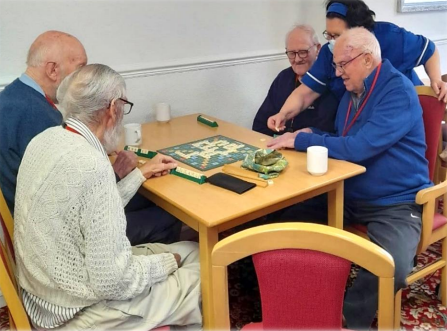How to Choose a Care Home
When the time comes for your parents or another elderly family member to move into a care home, it can be an emotional time. However, with the quality of care that most reputable nursing homes offer, moving a loved one into residential care does not have to be a negative experience. Often, older people enjoy their time in care homes as they offer an opportunity to socialise and partake in various activities, which may not have been possible when living independently.
All the while, as a family member, you can rest assured that your loved one is receiving quality care from kind, compassionate and experienced professionals.
When it comes to deciding how to choose a care home, there are numerous things to look out for, from the care services on offer to the home's location. Everything needs to be just right; after all, the chosen destination is going to be the permanent residence of your loved one, so it needs to feel like home. Below, we outline a comprehensive guide detailing everything a care home should offer you and the factors you need to consider so you can select the ideal location.
Extensive care services
First and foremost, you need to know your loved one’s care requirements to find a nursing home capable of accommodating them. Most care homes offer a combination of specialist care for complex needs and less hands-on care for residents who can live more independently.
It may be that your loved one does not need to live in a nursing home full-time but still wishes to make the most of the facilities at a local care home. Many homes, including Avon Park, offer day or respite care alongside
full-time residential care.
Elderly daycare - is ideal for those who want to socialise and partake in activities but then return to their homes overnight.
Respite care - is a valuable service for people with a part-time familial or professional carer who are not looked after at all times.
Every home offers slightly different services; ideally, you want to choose somewhere that offers a comprehensive range of services so that if the needs of your loved one change over time, they won’t need to be unnecessarily uprooted.
High quality care
Once you have collated a shortlist of homes that provide the desired care services you are looking for, you will then need to consider the quality of care on offer. You can do this by researching reviews and recommendations, or if you already know someone who lives at one of your prospective care homes, you can ask about their experiences.
However, the best way to discover the quality of care a home provides is to look to the
Care Quality Commission. As the established independent regulator for care homes in England, they regularly inspect care homes, ensuring they meet government standards and provide excellent services. You can search for local care homes in your area on their website and read recent inspection reports to get an idea of the quality of care available.
Friendly and experienced staff
Entrusting someone who isn’t a family member to care for your elderly loved one can be daunting, so knowing that the staff treat each and every resident with the utmost care and compassion is essential.
When you first visit a care home, you should immediately feel a welcoming atmosphere - are the staff friendly? Do they seem interested in the residents? Do they appear to have genuine relationships with them? These are all questions to keep in mind when inspecting a care home and meeting staff.
You should also find out what the staff-to-resident ratio is and whether a senior team member is present at all times. If you’ve heard that a home has a high staff turnover, with very few long-standing staff members, this could be a sign that the carers aren’t happy and do not have strong relationships with the residents.
Along with permanent carers within the home, it’s also worth exploring if they are linked with a GP practice and have regular visits from other health professionals, like opticians and dentists, to ensure residents receive the healthcare they need.
Flexible daily routine
The autonomy of residents is a significant requirement outlined in the official standards for residential nursing homes. While residents must receive care where necessary, they should also exercise their independence and manage their own time if capable.
You should find out how flexible the daily routine is. For example, can residents get up, wash and eat when they wish to? At meal times, residents should have the option to eat together or alone in their rooms, selecting from an extensive menu that does not just cater to different dietary requirements - but also changes frequently.
As a visitor, you may also wish to eat within the home when visiting a loved one or even hire out a private room for special occasions. Ask yourself - are you satisfied with the standard of the food? And would you be happy to eat this menu every day? You will also want to find out if there are any visitor restrictions - as you should have the flexibility to visit your loved one whenever you like and join them for meals or stay overnight.
A range of activities and social events
One of the main benefits of moving into a residential care home is the opportunity to socialise and enjoy a range of activities that otherwise may not have been accessible.
You want to choose a care home where residents are encouraged to live sociably and actively partake in activities as and when they wish. Lounge areas should offer enough space for residents to chat in groups, including staff and visitors, and there should also be a range of entertainment on offer, from TVs and radios in the residents' private rooms to books, magazines and even friendly pets in the communal spaces.
A big element of running a care home is
organising group activities and visits from people within the local community to lead classes. If your chosen care home has an activity coordinator, this is a good sign - as there should be an abundant calendar of activities.
Below, we list just a few examples of what might be available and may be of interest to your loved one:
- Music workshops and performances.
- Prayer and worship.
- Reading- book clubs, as well as reading groups for residents who are unable to read themselves.
- Skills workshops, for example, computer training or gardening.
- Arts and crafts.
- Film screenings.
- Health and beauty treatments.
- Exercise groups, for example, yoga or aerobics.
- Reminiscence groups are designed to help residents with dementia.
As well as a range of activities, your care home should also arrange regular day trips and community events, allowing visitors to join in. At Avon Park, we host regular summer BBQs, Christmas parties, and birthday celebrations for each resident, which is the perfect way to make everyone feel included.
Comfortable and homely atmosphere
Whilst a nursing home must be a functional space where residents can get the care they need, it must also offer a comfortable, homely environment, emitting its own sense of character.
Although some care homes have a clinical, hospital-like feel or a drab and depressing atmosphere, this is not the case for every home, with some encouraging a relaxing, homely feel. When you visit your shortlist of care homes, it is important to get a feel of each place, assessing whether it suits the personality and lifestyle of your loved one. Additionally, you should note if you feel comfortable enough to spend an afternoon there.
Remember, you’re allowed to visit care homes more than once; highlighting the importance of picking the perfect place.
Well-kept building and grounds
Whilst the staff are the main contributors to creating a comfortable atmosphere, how the building itself is upkept is also extremely important. Inside the building, it should look and smell clean and fresh, as well as being tastefully decorated with artwork, plants and ornaments - just as you’d want your own home to be.
Are residents able to decorate rooms with their own sentimental furniture and belongings? Do the rooms have ensuite bathrooms, or are residents expected to share? Can mobility aids be incorporated throughout the building to make all areas accessible? These are all things you should be looking for on your first visit.
With limited mobility, elderly people enjoy any opportunity to get outdoors and enjoy some fresh air. If your chosen home has extensive grounds with peaceful seating areas, pretty gardens and places to spot wildlife, this can make a residential home much more desirable.
A reasonably priced nursing care home
As you may expect, the final consideration when deciding how to choose a care home is cost.
Care home costs are often a big concern for family members, as the last thing you want to do is compromise the health and well-being of a loved one simply because you cannot afford the fees. Most care homes operate using contracts; it must be clear how these are structured, calculated and collected so that you are fully aware of what’s included and the level of care your loved one can expect for the price.
If you’re concerned about paying care home fees, you may be able to receive financial support. The Care UK website has plenty of useful information regarding
funding options, including advice on funding your own care and receiving support from the government or charities.
Most importantly, you should arrange a meeting with your chosen care home’s manager to discuss your loved one’s requirements, allowing them to put together a care plan that incorporates their needs at an affordable price.







